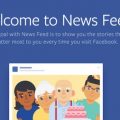How Facebook ‘Steals & Sells’ Your Private Information
If you think that setting your Facebook account into private hides your personal information, then you better think again. Yes, they’ve been keeping our information whether you go online or offline. And that’s what frustrates us the most, Facebook has been storing our information the moment we agreed with their policies. You may not notice it, but the more you agreed to their terms and conditions, the more you store your personal data in their database.
Sad to say, there are some users who just don’t pay too much attention to every agreement that they signed. As a result, they’ve been wondering why and how Facebook got their information where in fact, they didn’t give any. Again, Facebook keeps your personal information whether you like it or not. Well, there might be some advantages it gives to us. Perhaps, you don’t need to agree with their policies now and then. But if you are a keen observer, thinking about how Facebook uses your personal data with or without the user’s knowledge can sometimes be daunting and frustrating.
However, being curious about how things work for you and your Facebook account is not a bad thing at all. In fact, it is in our curiosity we would know how keeping personal information can be to our advantage or disadvantage. And considering our curiousness, this might be a good start to unravel how Facebook uses our personal data.
1. Keeping your data forever, even if you leave
Back to the old days, deleting your Facebook account is not as simple as you think it is. Yes, you can deactivate it, but still keeping all the information that you have. The only way you can delete the content you’d ever posted is through deleting it manually. You have to do step by step and email Facebook requesting an account deletion. Fortunately, Facebook added an option where users can easily delete their account.
However, there’s this misconception most users believe that all the personal information that we have can be removed when we delete our account. Not! When you try other forms of interaction on Facebook, like sending a message or posting in a Facebook group through another user account, your information is still retained by the company even if you have deleted your account.
2. Telling your friends what you buy online
One of the controversial moves of Facebook was having an ad platform called Beacon, where companies such as Travelocity and Fandango can automatically post items on the user’s news feeds citing what you just bought on their website. Facebook then eventually removed the said platform and paid $9.5 million to the disappointed users just to settle a class-action lawsuit.
Even if companies may not be able to automatically posts to your news feed, Facebook adds an option and a more transparent platform where users can still use their accounts to perform such actions on other websites. With that, they will still know the transaction you have made online.
3. Using your “Likes” in Ads
Aside from the controversial ad platform called Beacon, another controversial move Facebook got in legal trouble is the “Sponsored Story.” It is an ad format wherein it uses people’s names and photos in ads for the products they like without any compensation. This became the reason people got angry enough to file a class-action lawsuit on behalf of millions of other disappointed users whose names were included in the ads without their consent. Eventually, Facebook paid $20 million in a settlement to remove the Sponsored Story ad unit.
4. Tracking your movements across the web
Whether you realize it or not, just by browsing, liking or by sharing, Facebook keeps track on the things you do online. Moreover, the company will still be able to know what site you’re visiting, especially when you visit a site where a Facebook plug-in is available such as the “Like” button. Facebook uses cookies to log your data such as the date, time, URL and your IP address.
5. Forcing you to make your data searchable
Be mindful on what you post online. Cliché as it may seem, but everything you posts online is already a part of public information. Facebook recently removed a feature that allows the user to remove their profiles from search results. And as a result, your name, gender, cover photo, profile picture can already be viewed publicly and easily.
6. Using facial recognition software to spot you in Photos
Way back in 2010, Facebook has been experimenting a new feature where people can automatically tag their friends in new uploads using the facial recognition software, through the social network’s vast database. However, there are glitches found on the feature, which is why there were a lot of users who are worried about having their facial maps logged on Facebook servers. Facebook then eventually took their server offline worldwide for “technical improvements”. Facebook is currently working with the U.S Department of Commerce to pursue and improve the facial recognition software with a voluntary code of conduct.
7. Giving your data to the government
Whether you like it or not, one of the main sources of information is your Facebook account. The government can use your personal data found on your profile, especially with the National Security Agency, who usually asks a user’s information under the Foreign Surveillance Intelligence Act. The information can also be used for court order purposes. Moreover, Facebook has vowed for further transparency with the government access to data.
8. Interaction with your friends
Admit it! There are a lot of us here don’t know that through our interaction with our friends, Facebook can also track down the activities we do online. What topics you usually talked about, what kind of emojis you usually used, who you usually chat with and many other activities and other information you disclosed online.
9. The type of content you’re more likely to enjoy
Aside from the interaction with your friends, Facebook also knows and keeps information through the contents you’re most likely to enjoy. What site you usually visit, share and like, they all know. All the activities – the moment you log in to their account to the things you do online is recorded. If you have just noticed, users, who are not careful with the things they posts or do online, Facebook automatically blocks or bans your account. Of course, the company knows what you do.
10. Activities on a certain post
When you or your friends have a lot of likes, comments, and tags on the photos, it will most likely reflect and store in the Facebook database. Moreover, the more you do these activities, the more it will appear in your news feed.
Tracking down your activities online is possible through the use of cookies. A cookie is a small piece of data sent from a particular website to record the user’s browsing activity. Which is why, Facebook knows all your activities online. Moreover, Facebook doesn’t just rely on cookies, they also have their login and tracking solution.
In sum, if you are a kind of person who values personal information, then you have to secure it by being mindful of the things you do online. Every click means another information can of use and keep from you. There’s nothing wrong when you use Facebook, for as long as it won’t do any harm on your part.
Author: Janelle Yu
Janelle has great passion in writing various content topics especially about web design, digital marketing, SEO and social media. She is currently working at Optimind SEO as content writer. She also loves to travel and taking photos.
You May Also Like:
 10 Ways How Facebook Uses Your Personal Data
10 Ways How Facebook Uses Your Personal Data
 How to Delete Personal Information & Data from Google
How to Delete Personal Information & Data from Google
 How to Permanently Delete or Deactivate Facebook Account
How to Permanently Delete or Deactivate Facebook Account
 7 Facebook Privacy Tips – How to Protect Your Privacy on Facebook
7 Facebook Privacy Tips – How to Protect Your Privacy on Facebook
 How to Create Private, Closed or Secret Group on Facebook
How to Create Private, Closed or Secret Group on Facebook
 15 Tweaks to Customize Your Facebook News Feed
15 Tweaks to Customize Your Facebook News Feed
 8 Easy Tips to Protect Your Facebook Account from Hackers
8 Easy Tips to Protect Your Facebook Account from Hackers
 2 Facebook Apps to View and Manage Your News Feed
2 Facebook Apps to View and Manage Your News Feed
Tags: facebook, privacy & security, social media
Comments are closed.





































